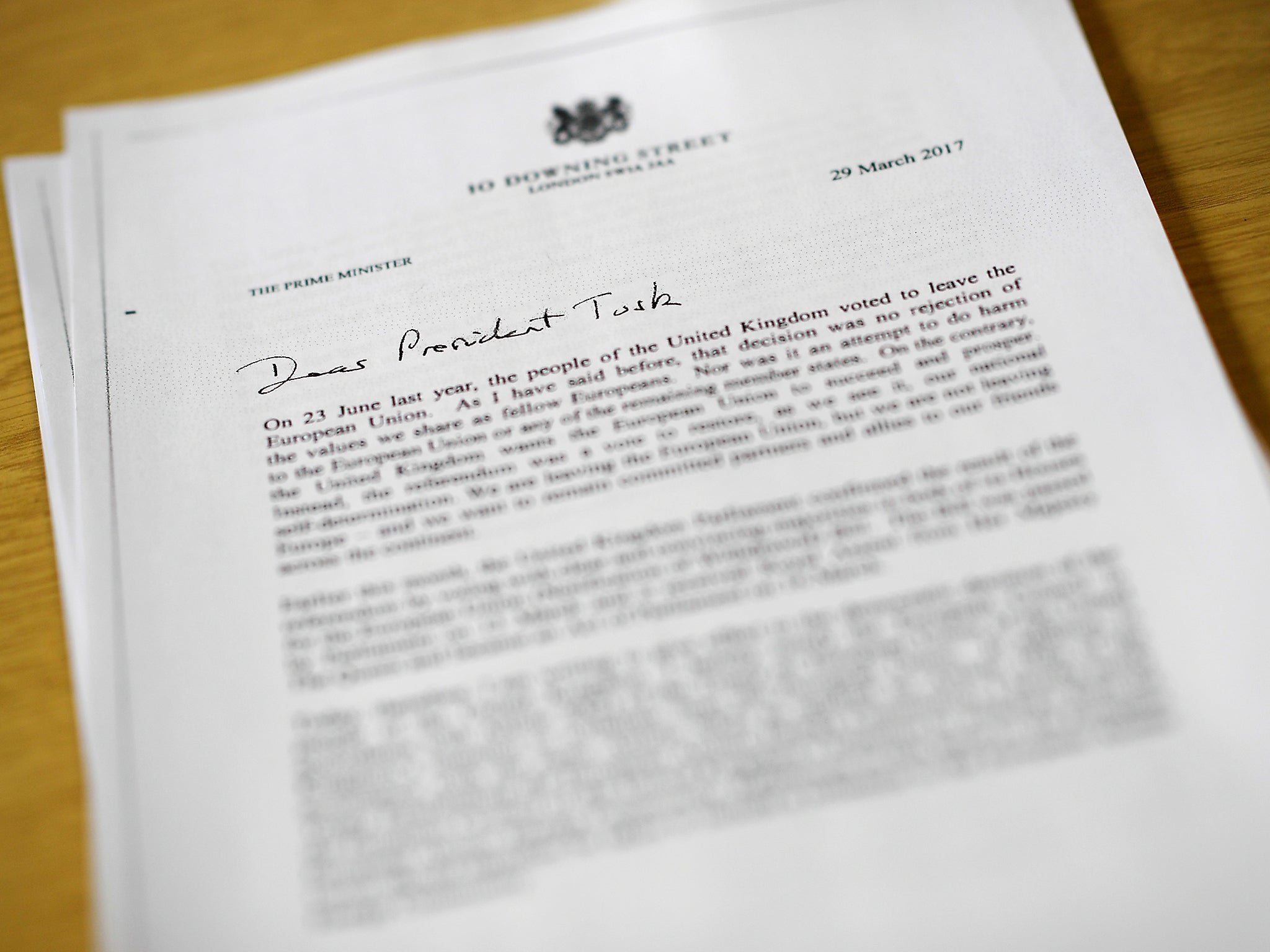Article 50 letter makes no mention of Theresa May's threat to leave the EU with 'no deal'
But the word 'security' is used 11 times - an apparent threat to weaken Britain’s military presence and intelligence co-operation if the talks cut up rough

Your support helps us to tell the story
From reproductive rights to climate change to Big Tech, The Independent is on the ground when the story is developing. Whether it's investigating the financials of Elon Musk's pro-Trump PAC or producing our latest documentary, 'The A Word', which shines a light on the American women fighting for reproductive rights, we know how important it is to parse out the facts from the messaging.
At such a critical moment in US history, we need reporters on the ground. Your donation allows us to keep sending journalists to speak to both sides of the story.
The Independent is trusted by Americans across the entire political spectrum. And unlike many other quality news outlets, we choose not to lock Americans out of our reporting and analysis with paywalls. We believe quality journalism should be available to everyone, paid for by those who can afford it.
Your support makes all the difference.The Article 50 letter makes no mention of Theresa May’s bombshell threat to crash out of the EU with no agreement if “no deal is better than a bad deal”.
And, significantly, it plays the supposed ace card of security loud and clear, implying a threat to weaken Britain’s military presence and intelligence co-operation if the talks cut up rough.
The long-awaited text appears to confirm the view of EU diplomats that the Government is stepping back from the stark "no deal" scenario, amid warnings of the huge economic damage it would cause.
The Prime Minister also points to the need for “implementation periods to adjust in a smooth and orderly way to new arrangements”, even if a new trade deal is struck – while refusing to use the word “transition”.
Today, in its hardline response, the European Parliament – which has the power to veto an exit deal – insisted Britain would not be allowed to use defence and security as “trade-off” to secure better trading arrangements.
But the letter reads: “In security terms, a failure to reach agreement would mean our cooperation in the fight against crime and terrorism would be weakened.”
And it adds: “Europe’s security is more fragile today than at any time since the end of the Cold War. Weakening our cooperation for the prosperity and protection of our citizens would be a costly mistake.”
Strikingly, the word “security” is mentioned no fewer than 11 times in a letter just six pages long. There is no mention of immigration, or controlling borders.
The stance was immediately condemned as “utterly scandalous” by Tim Farron, the Liberal Democrat leader, who tweeted: “This letter is a blatant threat - security cooperation has been lumped together with trade.”
In January, in her key Brexit speech, the Prime Minister revealed her threat to walk away if necessary, saying: “I am equally clear that no deal for Britain is better than a bad deal for Britain.”
It won loud cheers from many Conservative MPs and from the Tory press, apparently setting Britain on course for a ‘hard Brexit’.
But, under World Trade Organisation rules, firms would face tariffs on most goods and damaging ‘red tape’, if the EU refused to recognise the UK’s regulatory standards.
In today’s letter, Ms May makes clear Britain’s desire to achieve “a bold and ambitious Free Trade Agreement between the United Kingdom and the European Union”.
It states: “If, however, we leave the European Union without an agreement the default position is that we would have to trade on World Trade Organisation terms.”
Crucially – unlike in January – there is no warning that Britain is prepared to walk that perilous path, if necessary.
And the Prime Minister recognises the danger of a falling over a “cliff-edge as we move from our current relationship to our future partnership”.
The letter states: “People and businesses in both the UK and the EU would benefit from implementation periods to adjust in a smooth and orderly way to new arrangements.”
However, Ms May will insist that the details of a future deal are settled at the moment of exit – even if the implementation of some of them is delayed past 2019.
Notably, the letter acknowledges “there will be consequences for the UK of leaving the EU” – a stark contrast to her enthusiastic language about Britain’s bright future, on other occasions.
“We know that we will lose influence over the rules that affect the European economy,” the Prime Minister writes.
“We also know that UK companies will, as they trade within the EU, have to align with rules agreed by institutions of which we are no longer a part.”
The letter makes no mention of the Prime Minister’s ‘red line’ of ending the jurisdiction of the European Court of Justice – but she did stress it in her Commons statement.
Join our commenting forum
Join thought-provoking conversations, follow other Independent readers and see their replies
Comments